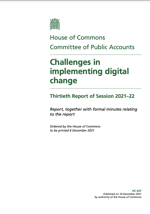Challenges the Civil Service faces in implementing digital change
Inexperience of senior government leaders is jeopardising digital transformation delivery, Commons committee says
Lack of knowledge and know-how among senior Civil Servants is behind a poor track record on digital transformation delivery in government, a House of Commons Public Accounts Committee report published on Friday has argued.
The report,  Challenges in implementing digital change, refers to recent IT project failures and cost overruns in the NHS and Home Office, and sets out a case that a lack of digital skills and capability among government’s senior non-specialist leadership makes it difficult to manage the integration and connections between different systems.
Challenges in implementing digital change, refers to recent IT project failures and cost overruns in the NHS and Home Office, and sets out a case that a lack of digital skills and capability among government’s senior non-specialist leadership makes it difficult to manage the integration and connections between different systems.
The Public Accounts Committee is the group of MPs responsible for holding government and civil servants to account for public money expenditure and delivery of government projects. It is estimated that the government spends £20 billion each year on digital transformation projects across government departments and the NHS.
The report, which includes six conclusions and recommendations on the challenges of implementing digital change in government, says that senior leaders’ dearth of technical background in digital and data is to blame for the unrealistic scope of a great number of projects and missing long-lasting results.
“Senior leaders need to grasp the potential for technology and data to transform the business of government, and the need to think strategically about opportunities in the future,” the document states. “[…] the centre of government needs to do more to ensure all senior decision-makers have confidence in digital business models, their enabling technologies, and data, and how to apply them to transform government.”
The conclusions of the Public Accounts Committee are in line with the Government’s own view of Whitehall’s ability to deploy, manage and fully leverage technology.
The Declaration of Government Reform, released in June by the Prime Minister, identified the need for a new curriculum for the Senior Civil Service to acquire technical and project delivery skills, and a data masterclass has been created, along with a mandatory requirement to report IT costs and risk.
Furthermore, the National Audit Office published a report in July which revealed that lack of strong leadership and senior decision makers’ inability to understand digital change implementation has created “a consistent pattern of underperformance” of digital transformation projects across government.
Similarly to the Committee of Public Accounts, the spending watchdog concluded that digital transformation and data strategies are still poorly understood in the Senior Civil Service, resulting in a waste of taxpayers’ money and delays in public service delivery.
Other conclusions by the Committee of Public Accounts include the absence of clear plans to replace or modernise government departments legacy systems and data, as well as lack of understanding between systems improvement and digital transformation. Failure to develop “a modern professional” approach to IT operations and over reliance on outsourcing are also named as causes for impeding the progress of digital transformation.
To fix this problem, the Public Accounts Committee recommends the Cabinet Office to develop a robust and certifiable digital business change education for senior leaders, including ministers, departmental boards and senior civil servants.
It also asks the Central Digital and Data Office, a new body created in 2021 to lead on government digital, data and technology functions, to work with other departments to map legacy systems and produce milestones for action by the end of 2022.
The government has two months to respond to the findings and recommendations of the report.





